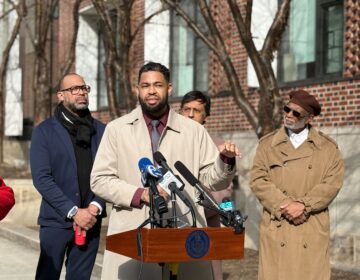Penn Law prof’s comments prove need for racial justice in legal profession
America can never have just laws and policies, or a system that brings equality to everyone, if the caretakers and decision makers of our legal institutions are mostly white.

Locust Walk on the University of Pennsylvania campus in West Philadelphia. (Emma Lee/WHYY)
Why are diversity and inclusion important in the legal profession and in society in general? The justice system is not colorblind, and black and brown men disproportionately fill America’s prisons. If the caretakers and decision-makers of our legal institutions do not reflect the diversity of America, they cannot claim to represent everyone, and society can never hope to overcome unconscious racial bias and discrimination.
The need for diversity and inclusion is as important as ever, as is activism in pursuit of those goals. This reality was brought home very recently when Amy Wax — a University of Pennsylvania Law School professor — denigrated African-American students by questioning their intelligence and claiming they do not belong there.
Wax —who co-wrote an op-ed in the Philadelphia Inquirer in August arguing that the country must return to the “bourgeois” cultural values of the 1950s and who said that all cultures are not equal — appeared in a YouTube interview a month later in which she made derogatory comments about African-American students and alumni. In the video, she told Glenn Loury, an African-American professor at Brown University, that black students at Penn Law and elsewhere should not even go to college, and — echoing the anti-civil rights views of the late U.S. Supreme Court Justice Antonin Scalia — are placed in “demoralizing” and “mismatched” environments where they are asked to compete with people who are “more skilled, sometimes significantly more skilled.”
“I don’t think I’ve ever seen a black student graduate in the top quarter of the class, rarely in the top half,” she said. “I can think of one or two students who’ve graduated in the top half of my required first year course.”
Wax also claimed that the student-run University of Pennsylvania Law Review has a racial diversity mandate, suggesting students of color who write for the publication are subpar and undeserving.
When I graduated from Penn Law 15 years ago this year, I was president of the Black Law Students Association and part of a coalition of student activists who, concerned about problems of racial inclusion among students and faculty, formed the Penn Law Diversity Initiative. Fifteen years later, these issues around race have not disappeared.
Wax’s remarks have drawn criticism from students, alumni, and professors alike.
A petition signed by more than 800 alums in under a week urged Dean Ted Ruger to respond to Wax’s demeaning and disparaging lies and prohibit her from teaching first-year students and sitting on key committees.
In a thoughtfully written letter to the Penn Law community, Ruger refuted Wax’s claims. He also removed the professor from teaching first-year classes and said he will soon announce initiatives to encourage conversations on freedom of expression, diversity, and inclusivity.
Wrote Ruger:
“In light of Professor Wax’s statements, black students assigned to her class in their first week at Penn Law may reasonably wonder whether their professor has already come to a conclusion about their presence, performance, and potential for success in law school and thereafter. They may legitimately question whether the inaccurate and belittling statements she has made may adversely affect their learning environment and career prospects. These students may reasonably feel an additional and unwarranted burden to perform well, so that their performance not be used or misused by their professor in public discourse about racial inequality in academic success. More broadly, this dynamic may negatively affect the classroom experience for all students regardless of race or background.”
Being young, gifted, and black in America means navigating those in society who promote the narrative of your intellectual inferiority and root for your failure. You are bombarded daily with microaggressions and blatant assaults on your psyche, from those who wish ill upon you and will exert their power so that they may stop you in your tracks. For a first-grader or a first-year law student, this makes for a traumatic, triggering, and alienating experience.
Whites make up over 80 percent of all lawyers, making law the least diverse profession in America. And it is even worse at the top: While lawyers of color are 16 percent of law firms, they are a mere 9 percent of law partners and 11 percent of general counsels at Fortune 500 corporations.
As of 2016, white men were 58 percent of state court judges — who try 90 percent of the cases in the U.S. — and 60 percent of federal court judges, with President Trump working in earnest to increase that number at the highest rate in decades. Further, 95 percent of elected prosecutors are white, and 83 percent are men.
Law schools, which provide the pipeline for the attorneys and for law professors, have improved their enrollment of black and Latino students, though many prestigious schools need to do more.
Why is this important? America can never hope to have just laws and policies, or a system that brings equity and equality to everyone if the vast majority of judges, prosecutors, defense attorneys, and law professors are white.
We live at a time when activism matters, when people are taking a stand and demanding change — from #BlackLivesMatter and #MeToo to the striking teachers and the high school student walkouts against gun violence. While everyone is not committed to ensuring equality and opportunity for all and ending institutional racism, those who cannot tolerate things as they are must shout it to the rooftops and fight for justice.
WHYY is your source for fact-based, in-depth journalism and information. As a nonprofit organization, we rely on financial support from readers like you. Please give today.




